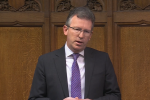
At the heart of the decision taken by Parliament to establish a new Health and Social Care Levy, equivalent to a 1.25% increase in National Insurance contributions, is an inescapable reality. More of us are needing care and needing it for longer. That extra care, especially if we are also to improve its quality, will cost more money. Any method of raising the substantial sums needed will be painful and unpopular. Anyone who claims otherwise is fooling themselves, or trying to fool you. You might reasonably argue that politicians of all parties should have grasped this nettle long ago and despite some brave attempts to do so, our collective failure to bring forward and agree meaningful social care reform has been largely indefensible. We have, however, now been given effectively no choice. Perhaps the statistic I found most striking in the Prime Minister’s case to the House of Commons for this change was that, as COVID-19 hit us, 30,000 of the 100,000 or so available beds in the NHS were occupied by people who could and should have been cared for instead in the Social Care system. As the NHS struggles to clear the immense backlog of treatments for other conditions which were not administered during that period, this is no longer sustainable. With Government spending under intense pressure following significant outlays on COVID-related support and costs, paying for social care improvement through means other than extra taxation is also no longer viable.
I therefore voted in favour of the new levy, and I appreciate it is not what many would expect a Conservative MP or a Conservative Government to do. I do think though that it is the best option in the changed, and unforeseen, circumstances we now face. The levy recognises the interconnectedness of health and social care and, as I have said, I do not believe the NHS can tolerate further delay, largely due to the effects of the pandemic. Alternative sources of funding are either undesirable or infeasible. It cannot be right to increase our national debt yet further, or to divert funding from elsewhere. Those who say that another form of extra taxation would be preferable need to explain what they have in mind. Income Tax is not ringfenced for health and social care, as this levy will be, and businesses would share none of the burden. Other taxes like Capital Gains Tax do not bring in anywhere near enough to be used. Under the Levy proposal, the lowest paid and smaller businesses will be exempt. A basic rate taxpayer will pay much less than a higher-rate taxpayer and a parallel increase in another tax will ensure those who derive their income from dividends will also pay their share.
It is important too to recognise the benefits of this change. It is the potentially unlimited nature of care costs that is most worrying for most of us. A cap of £86,000 and increases in the amount of capital an individual can retain and still have the state contribute to (or cover completely) the costs of their care reduce that worry substantially given that 1 in 7 of us now will end up paying more than £100,000. The cap will also make it possible for insurance products to be developed and purchased which would not have been possible with potentially unlimited care costs. Of course this extra money and reform does not solve all the problems social care faces. There is more to do, but this is necessary action. We have avoided it for too long.

